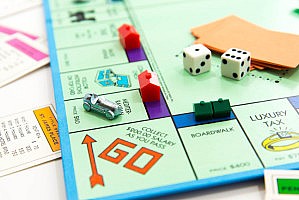
“A virtue of gaming that is sometimes overlooked by those seeking grander goals is its unparalleled advantages in training and educational programs. A game can easily be made fascinating enough to put over the dullest facts. To sit down and play through a game is to be convinced as by no argument, however persuasively presented.”
— A.M. Mood, RAND Corporation (1954)
Look no further than the Learning Lab for proof that games play an increasingly valuable role in the classroom and beyond, having long been recognized as a uniquely effective means of experiential education. But while, today, we harness technology and data to craft immersive, competitive simulation platforms, sometimes all you need to teach complex concepts is a board, some moveable pieces, and a pedagogical goal.
Take chess, for instance, which has been used for centuries to impart lessons of military strategy – its rules and competitive purpose create the conditions for tactical thinking and planning needed to checkmate one’s opponent.
Then there’s Monopoly, wherein the primary objective is to bankrupt everyone else through clever investment strategies. Hard to square that with lofty, Ivy-league business objectives, right? Yet, what is arguably the world’s best-selling board-based simulation of capitalism (and frequent ruiner of family game night) was once used as a teaching aid in Wharton economics classes. But before you cynically smirk at the very idea, there’s something you should know about the game’s hidden history: A century ago, Monopoly was not a platform to illustrate the merits of a laissez-faire system; rather, it was a way to demonstrate an alternative to the corporate rent-seeking that drives inequality.
Read more Monopoly’s Anti-Capitalist, Socialist Roots as a Teaching Game at Wharton


